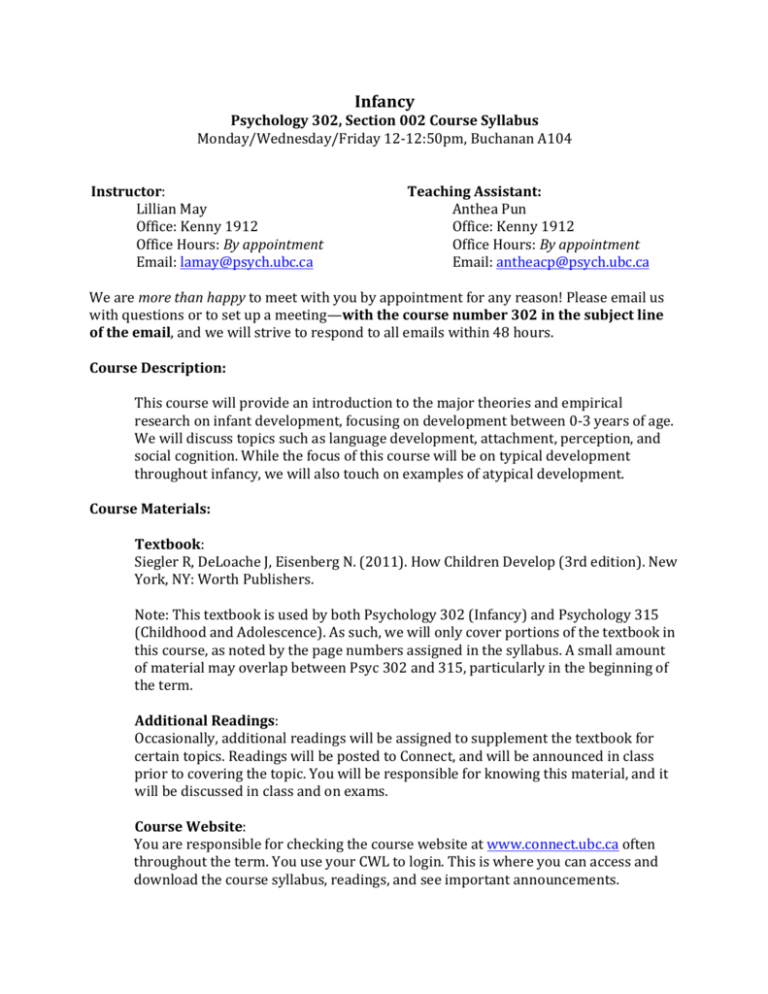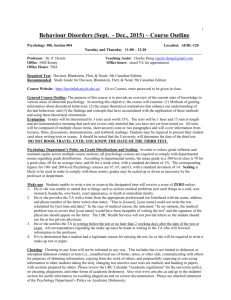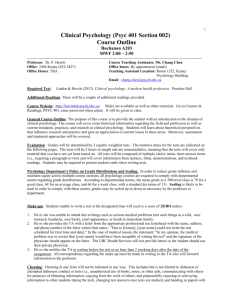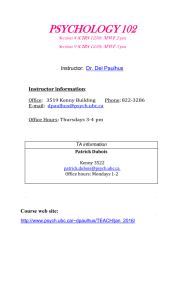Infancy - WordPress.com
advertisement

Infancy Psychology 302, Section 002 Course Syllabus Monday/Wednesday/Friday 12-­‐12:50pm, Buchanan A104 Instructor: Teaching Assistant: Lillian May Anthea Pun Office: Kenny 1912 Office: Kenny 1912 Office Hours: By appointment Office Hours: By appointment Email: lamay@psych.ubc.ca Email: antheacp@psych.ubc.ca We are more than happy to meet with you by appointment for any reason! Please email us with questions or to set up a meeting—with the course number 302 in the subject line of the email, and we will strive to respond to all emails within 48 hours. Course Description: This course will provide an introduction to the major theories and empirical research on infant development, focusing on development between 0-­‐3 years of age. We will discuss topics such as language development, attachment, perception, and social cognition. While the focus of this course will be on typical development throughout infancy, we will also touch on examples of atypical development. Course Materials: Textbook: Siegler R, DeLoache J, Eisenberg N. (2011). How Children Develop (3rd edition). New York, NY: Worth Publishers. Note: This textbook is used by both Psychology 302 (Infancy) and Psychology 315 (Childhood and Adolescence). As such, we will only cover portions of the textbook in this course, as noted by the page numbers assigned in the syllabus. A small amount of material may overlap between Psyc 302 and 315, particularly in the beginning of the term. Additional Readings: Occasionally, additional readings will be assigned to supplement the textbook for certain topics. Readings will be posted to Connect, and will be announced in class prior to covering the topic. You will be responsible for knowing this material, and it will be discussed in class and on exams. Course Website: You are responsible for checking the course website at www.connect.ubc.ca often throughout the term. You use your CWL to login. This is where you can access and download the course syllabus, readings, and see important announcements. Additionally, lecture slides will be posted at least 1 hour before each class, barring extraneous circumstances. These slides are not complete, but serve as an outline for the lecture of the day. We have also made discussion forums available to support peer and self-­‐motivated learning. Course Requirements and Grading: 1. Class Attendance: Attendance is expected. Although we will not take attendance at each class, there will be material covered in class in substantially greater depth than what is covered on the lecture slides on Connect. By regularly attending class you ensure yourself the best chance to excel. 2. Writing Assignment: Research Proposal (30% total) A huge part of Psychology is figuring out what questions are unanswered, and formulating the research to try and answer these questions. In your writing assignment, you will write a paper proposing a new research study designed to address some unanswered question in infant development (0-­‐3 years). Your paper will include a Background or Introduction section where you summarize relevant previous research to your topic (at least 3 past published empirical studies) and explain why your research question is new/unanswered, then a Proposed Design section where you go over how you plan on addressing your question of interest (going over the methods, age etc. of subjects you propose testing). At various point during the term we will go over in class how you can go about working on this assignment, including finding empirical articles on PsycInfo. Additionally, you will turn in an outline halfway through the term and receive feedback to help you with the final version. Outline: 10% Your outline should include your question of interest, brief summaries of the past research articles you will be including in your Background/Intro section, and a brief idea of your design. This outline should be in point-­‐style. Final Version: 20% The final version of your research proposal should be between 5-­‐8 pages (double spaced), and written in a formal academic style. It should also include a references section, where you must correctly cite all papers you have referred to/referenced throughout your paper 3. Midterms (40%): Two midterms, each worth 20% of final mark. Covers material from lecture, slides, textbook, and readings prior to each midterm. Multiple choice, fill-­‐in-­‐the-­‐blank, and short answer. 4. Final (30%): Covers material from the whole term, with a strong focus on new material from after the midterm. Multiple choice, fill-­‐in-­‐the-­‐blank, and short answer. Note on Exams: Both the Midterm and Final Exams are designed to not only test your knowledge of facts, but to challenge you to apply and integrate what you have learned to new situations and contexts. To do well, you must do more than simply memorize information, but should be actively engaged in the learning process. 5. Additional Human Subjects Pool Credits (up to 3%) ***Note on missed exams, delayed papers, special accommodation***: A person who misses an exam for a valid medical reason only (with doctor’s note) will be allowed to write a make-­‐up exam. If you are unwell on the day of a midterm, please arrange to see a doctor and contact the instructor and/or TA as soon as possible to make arrangements. The paper assignment and outline must be turned in AT THE START OF CLASS on the due date. A penalty of 10% of the paper grade will be applied for each day that the paper is late. If you require any special accommodation for exams or for classes (e.g., because of a disability), please contact the instructor as early as possible. Additional Resources Available to You: For learning: UBC Academic Regulations: Information on academic regulations, including course withdrawal dates and credits, can be found in the UBC Calendar at http://students.ubc.ca/calendar UBC Learning Commons: http://learningcommons.ubc.ca offers a variety of learning and research sources for students. The website includes tutoring, workshops, study groups, many other online tools, and links to most of the academic resources offered at UBC. UBC Writing Centre: www.writingcentre.ubc.ca offers tutoring services, online workshops, and links to other useful writing centres. For coping with stress and hardship: UBC Counseling Services: http://www.students.ubc.ca/livewelllearnwell/book-­‐an-­‐ appointment/counselling-­‐services/ or 604-­‐822-­‐3811 Vancouver Crisis Line: http://www.crisiscentre.bc.ca/about-­‐us/contact-­‐us/ Skills for Time Management: http://learningcommons.ubc.ca/time-­‐management/ Ethical and Responsible Conduct: Always treat yourself, your classmates, and your instructors with respect both in and outside of class. This includes being on time to class, and being aware of your words and actions. Be mindful of other students during class. Please turn off all mobile phones, mp3 players, etc. before coming to class. If you choose to take notes on a laptop, please quit/minimize any programs that may distract others (internet, IM, facebook, games, etc). Cheating of any type is not tolerated. Just don’t do it—it is not worth your education, your reputation, or your future. Any cheating will result in failing the assignment or exam, and may lead to an automatic fail for the course and/or expulsion from the university. If you have any questions about citing or using sources in your assignments, please see your Instructor or TA BEFORE the assignment is due. _________________________________________________________________________________________________ Department of Psychology’s Position on Grade Distribution and Scaling: In order to reduce grade inflation and maintain equity across multiple course sections, all psychology courses are required to comply with departmental norms regarding grade distributions. According to departmental norms, the average grade in a 100-­‐ and 200-­‐level Psychology courses are 67 for an exceptionally strong class, 65 for an average class, and 63 for a weak class, with a standard deviation of 14. The corresponding figures for 300-­‐ and 400-­‐level classes are 70, 68, and 66, with a standard deviation of 13. Scaling may be used in order to comply with these norms; grades may be scaled up or down as necessary by the professor or department. Each student will earn a percent grade for this course and will be automatically assigned a corresponding letter grade by the Registrar. Department of Psychology’s Position on Academic Misconduct: Cheating, plagiarism, and other forms of academic misconduct are very serious concerns of the University, and the Department of Psychology has taken steps to alleviate them. In the first place, the Department has implemented software that can reliably detect cheating on multiple-­‐choice exams by analyzing the patterns of students’ responses. In addition, the Department subscribes to TurnItIn – a service designed to detect and deter plagiarism. All materials (term papers, lab reports, etc.) that students submit for grading will be scanned and compared to over 4.5 billion pages of content located on the Internet or in TurnItIn’s own proprietary databases. The results of these comparisons are compiled into customized “Originality Reports” containing several sensitive measures of plagiarism; instructors receive copies of these reports for every student in their class. In all cases of suspected academic misconduct the parties involved will be pursued to the fullest extent dictated by the guidelines of the University. Strong evidence of cheating or plagiarism may result in a zero credit for the work in question. According to the University Act (section 61), the President of UBC has the right to impose harsher penalties including (but not limited to) a failing grade for the course, suspension from the University, cancellation of scholarships, or a notation added to a student’s transcript. All graded work in this course, unless otherwise specified, is to be original work done independently by individuals. If you have any questions as to whether or not what you are doing is even a borderline case of academic misconduct, please consult your instructor. For details on pertinent University policies and procedures, please see Chapter 5 in the UBC Calendar (http://students.ubc.ca/calendar) and read the University’s Policy 69 (available at http:/www.universitycounsel.ubc.ca/policies/policy69.html). Class Schedule This schedule is subject to change. Any changes will be announced both in class and on the course website. September 6, 9, 11, 13: Introduction, History, & Research Methods Required Reading: Chapter 1 September 16, 20: Prenatal Development & Birth No class September 18 Required Reading: Chapter 2; Whitfield, 2003 September 23, 25, 27: Brain Development & Biology Required Reading: Chapter 3 to pg 118 September 30, October 2, 4: Major Theories of Development Required Reading: pgs 128-­‐137, 154-­‐171, 342-­‐357; Spelke & Kinzler, 2007 October 7: MIDTERM EXAM 1 October 9, 11: Perceptual Development Required Reading: Chapter 5 to pg 190 October 16, 18: Motor Development Required Reading: pgs 190-­‐199; Thelen, Fisher, & Ridley-­‐Johnson, 2002 No class October 14 (Thanksgiving) ASSIGNMENT OUTLINE DUE OCTOBER 16 October 21, 23, 25: Cognitive Development Required Reading: 199-­‐211, 260-­‐265 October 28, 30, November 1: Language Development Required Reading: Chapter 6 to pg 253; Bergelson & Swingley, 2012 November 4: MIDTERM EXAM 2 November 6, 8, 13, 15: Social Development & Social Cognition Required Reading: pgs 266-­‐272, 383-­‐391, 396-­‐398, 400-­‐407, 424-­‐436; Onishi & Baillargeon, 2005; Johnson, Dweck, & Chen, 2007 No class November 11 (Remembrance Day) November 18, 20, 22: Moral Development Required Reading: Chapter 14 up to pg 551; Hamlin, Wynn, & Bloom, 2007 November 25, 27, 29: Atypical Development & Wrap-­‐Up Required Reading: Zwaigenbaum et al., 2005; Doja & Roberts, 2006 ASSIGNMENT FINAL VERSION DUE NOVEMBER 25 Final Exam to be scheduled during University Exam Period





![July 31 Connect eupdate DRAFT [1]](http://s3.studylib.net/store/data/008100166_1-21bd0e395dcbfd67aaad5f18dd4ec08e-300x300.png)


